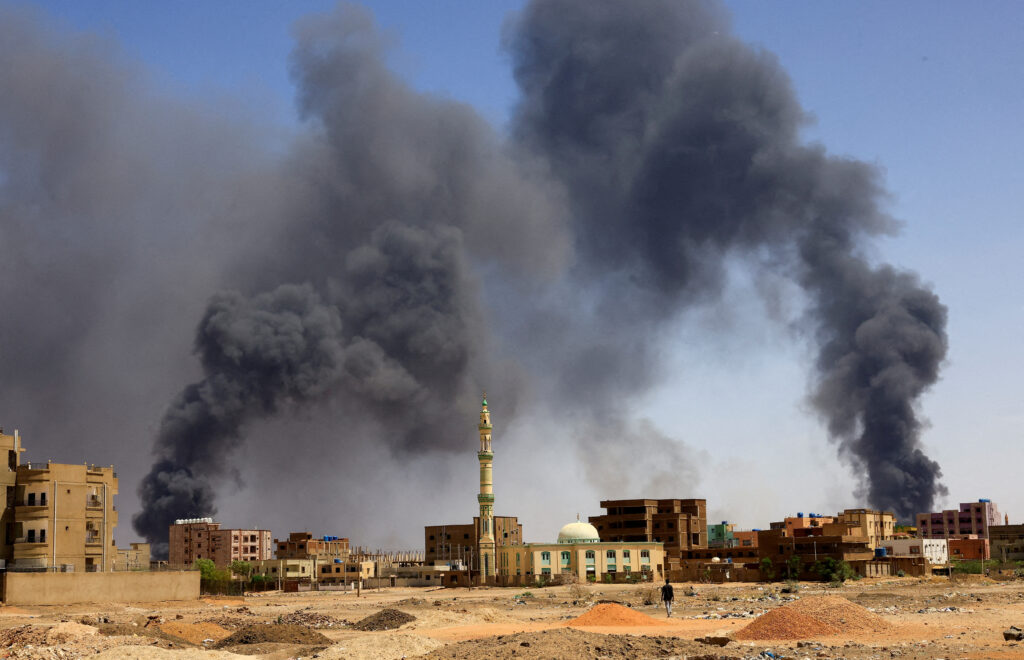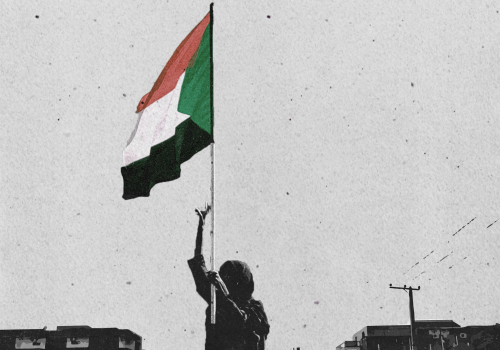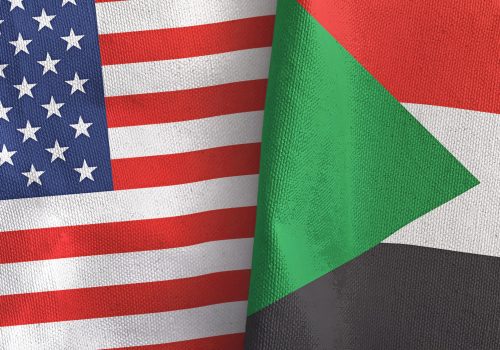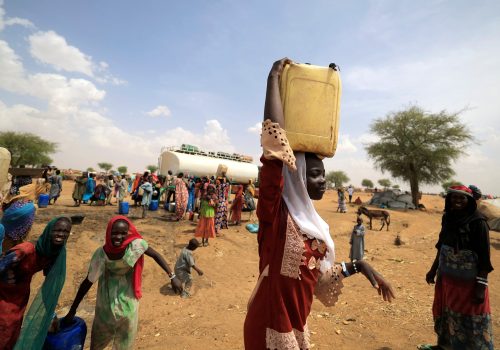The toll of the ongoing civil war in Sudan is staggering. According to an estimate by Médecins Sans Frontières, every two hours a child dies of severe malnutrition in a displacement camp in Sudan’s North Darfur state. The war—a power struggle that began in April 2023 in Khartoum between the Sudanese Armed Forces (SAF) and the paramilitary Rapid Support Forces (RSF)—is now marked by 10.7 million Sudanese displaced, more than half of them children.
Sudan is experiencing its worst levels of food insecurity ever recorded, with more than 25.6 million people across ten states facing heightened risk of famine. Seventeen months into one of the world’s worst humanitarian crises, the internal conflict has spread across the country and is marked by widespread death, war crimes, recruitment of children as soldiers, rape and violence against women, disease, intentional destruction of the country’s food reserves, and now heavy rains causing flooding.
The full scope of international attention on Sudan
On August 14, a delegation, including countries supporting the RSF, claiming to want to improve the humanitarian situation in Sudan met in Geneva. The Aligned for Advancing Lifesaving and Peace in Sudan (ALPS) Group, whose members included the United States, Switzerland, Saudi Arabia, Egypt, the United Arab Emirates (UAE), the African Union, and the United Nations, convened to develop immediate actions to alleviate the suffering of the Sudanese people. The ALPS facilitated ten days of peace talks between the warring parties. The RSF attended the talks in person and the SAF attended virtually.
At the end of the negotiations, two access points for food, medicine, and humanitarian aid were opened—the Western border crossing into Darfur at Adre, Chad, and the Dabbah Road crossing, allowing access to the north and west from Port Sudan. This is a small step, but the Sudanese people need much more.
The atrocities in Sudan have not received enough attention. The lack of sustained international scrutiny, especially from the United States, has allowed the conflict to deepen. The crisis is exacerbated by the global community’s diminished will to address the root causes of the war. Corruption and personal gain are fueling the conflict. Foreign malign actors, in a fight for Sudanese natural resources and the ability to exploit the country’s strategic location, supply funds and weapons to the RSF and the SAF.
Corruption appears in many forms. According to the United States Agency for International Development, “corruption employs sophisticated schemes to siphon off the wealth of a country from its rightful owners: the people.” One form of corruption, strategic corruption, as demonstrated in Sudan, involves the improper influence by international actors in collaboration with domestic actors to weaponize practices of foreign policy or access to natural resources. Activities such as gold mining are prioritized to the benefit of domestic power and corrupt foreign interests above the interests of the people.
Sudan’s civil war has a large cast of foreign malign actors. A June 2024 report by Amnesty International found that despite the Darfur embargo, recently manufactured guns, ammunition, drone jammers, mortars, and rifles have been imported into Sudan in large quantities from Russia, China, Turkey, and the UAE. Paul Sullivan, an analyst who focuses on the Middle East and North Africa, told Voice of America last year that China is interested in Sudan’s gold deposits and the Port Sudan location on the Red Sea in relation to growing world trade.
Sudan-Russia talks that began in 2007 under Omar al-Bashir were revived in June 2024, with Sudan’s RSF agreeing to give Russia a Red Sea base in exchange for weapons, ammunition, and replacement parts for Russian-made warplanes. Russia’s extended ties to Sudan also include gold mining that is presently organized by the Kremlin’s Africa Corps (and which was formerly run by the Wagner Group).
In March 2024, Iran petitioned Sudan to establish a naval base at the Port of Sudan on the Red Sea. The SAF rejected Iran’s request. Despite the rejection, Iran has reportedly supplied the SAF with Mohajer-6 drones.
Finally, there is the UAE. In violation of the Darfur arms embargo, the UAE is supplying weapons and ammunition to the RSF, as documented by a 2024 United Nations report to the Security Council. (The UAE strongly denies arming any group in Sudan.) The UAE is also the largest buyer of Sudanese gold. The RSF commits grievous violence against civilians using funds and weapons reportedly supplied by the UAE in return for gold from the country’s massive gold supplies. In 2023, Sudan was the third largest gold-producing country in Africa, yet Sudanese civilians are dying of hunger at the hands of corrupt military factions.
How the United States should respond
Foreign malign influence in Sudan is widespread, and strategic corruption is a relatively new and complex concept. In addition, some US government agencies do not yet have a clear definition of strategic corruption that would allow them to categorize its extent.
For this reason, the United States should develop a government-wide definition for strategic corruption. Doing so could help facilitate a whole-of-government response and allow agencies to better identify the full extent of illicit activity and the foreign actors involved in Sudan and the region.
With this clearer sense of foreign malign influence in Sudan, the United States could then consider wider sanctions against states and individuals involved in the crisis, and it could encourage partner countries to do the same. In addition, Washington should continue to garner international cooperation to end the war.
The August peace talks facilitated by the ALPS Group in Switzerland have ended. The hosting delegations have returned home. The flurry of articles on the conflict, and with it the world’s attention to the floods, famine, and atrocities in Sudan, have lessened. The Sudanese people, now more than ever, need the help of the United States and the international community to bring an end to the war; identify and hold accountable everyone enabling the violence; bolster sustained engagement for greater access to humanitarian aid; and continue to advocate for peace, stability, and the restitution of the rule of law.
Andrea Currie-Edwards is a senior technical advisor for anti-corruption and illicit finance with Millennium Partners, and former consultant to the World Bank Group.
Further reading
Tue, Aug 8, 2023
Sudan’s precarious information environment and the fight for democracy
Report By
An examination of the time from December 2018, when protests against then-president Omar al-Bashir first broke out, and December 2022, when a framework agreement between civilian and military leaders came into play.
Tue, Aug 8, 2023
A US agenda for action in Sudan’s information environment
Issue Brief By
A brief on how the United States and Sudan can collaborate on combatting disinformation and building up the African nation's democratic potential.
Thu, May 11, 2023
Experts react: Sudan at the crossroads—where the conflict goes from here
MENASource By Benjamin Mossberg, Alia Brahimi, Thomas S. Warrick, Shahira Amin, R. Clarke Cooper
Atlantic Council experts react to the conflict in Sudan and discuss how it will impact the region and beyond.
Image: A man walks while smoke rises above buildings after aerial bombardment, during clashes between the paramilitary Rapid Support Forces and the army in Khartoum North, Sudan, May 1, 2023. REUTERS/Mohamed Nureldin Abdallah/File Photo.



